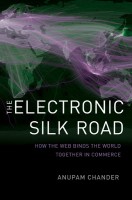Articles by Adam Thierer 
 Senior Fellow in Technology & Innovation at the R Street Institute in Washington, DC. Formerly a senior research fellow at the Mercatus Center at George Mason University, President of the Progress & Freedom Foundation, Director of Telecommunications Studies at the Cato Institute, and a Fellow in Economic Policy at the Heritage Foundation.
Senior Fellow in Technology & Innovation at the R Street Institute in Washington, DC. Formerly a senior research fellow at the Mercatus Center at George Mason University, President of the Progress & Freedom Foundation, Director of Telecommunications Studies at the Cato Institute, and a Fellow in Economic Policy at the Heritage Foundation.
A new article by Peter Caranicas and Rachel Abrams in Variety entitled, “Runaway Production: The United States of Tax Incentives,” notes how “[Motion picture] Producers looking for a location weigh many factors — screenplay, crew base, availability of stages, travel and lodging — but these days, first and foremost, they consider the local incentives and tax breaks that can reduce a production’s budget.” In other words, when every state and local government dreams of being “the next Hollywood,” they are willing to shower the entertainment industry with some pretty nice inducements at taxpayers expense.
But these programs are growing more controversial and some state and local governments are reconsidering the wisdom of these efforts. The article cites my Mercatus Center colleague Eileen Norcross, who points out the most serious problem with these programs:
Other arguments against incentives hold that they don’t help the states that offer them. In March, the Massachusetts revenue commission issued a scathing report on the state’s tax credit program, which stated that two-thirds of the total $175 million awarded in 2011 went to out-of-state spending. “The critique is that while they appear to bring in short-term temporary activity to a state or community, a lot of those benefits flow to the production companies,” says Eileen Norcross, a senior research fellow at George Mason U. “The people who are hired locally tend to be (in) more low-wage service industry jobs. It provides a temporary economic blip on the radar, and then it’s sort of fleeting.”
Eileen is exactly right. I have previously covered this issue here in an essay entitled, “State Film Industry Incentives: A Growing Cronyism Fiasco,” which was later expanded and included as a section in my 73-page forthcoming law review article with Brent Skorup, “A History of Cronyism and Capture in the Information Technology Sector.” Continue reading →
 As I’ve noted before, I didn’t start my professional life in the early 1990s as a tech policy wonk. My real passion 20 years ago was free trade policy. Unfortunately for me, as my boss rudely informed me at the time, the world was already brimming with aspiring trade analysts and probably didn’t need another. This was the time of NAFTA and WTO negotiations and seemingly everybody was lining up to get into the world of trade policy during that period.
As I’ve noted before, I didn’t start my professional life in the early 1990s as a tech policy wonk. My real passion 20 years ago was free trade policy. Unfortunately for me, as my boss rudely informed me at the time, the world was already brimming with aspiring trade analysts and probably didn’t need another. This was the time of NAFTA and WTO negotiations and seemingly everybody was lining up to get into the world of trade policy during that period.
And so, while I was finishing a master’s degree with trade theory applications and patiently hoping for opportunities to open up, I decided to take what I thought was going to be a brief detour into the strange new world of the Internet and information technology policy. Of course, I never looked backed. I was hooked on Net policy from Day 1. But I never stopped caring about trade theory and I have always remained passionate about the essential role that free trade plays in expanding commerce, improving human welfare, and facilitating more peaceful interactions among the diverse cultures and countries of this planet.
I only tell you this part of my own backstory so that you understand why I was so excited to receive a copy of Anupam Chander’s new book, The Electronic Silk Road: How the Web Binds the World Together in Commerce. Chander’s book weaves together trade theory and modern information technology policy issues. His over-arching goal is to sketch out and defend “a middle ground between isolation and unregulated trade, embracing free trade and also its regulation.” (p. 209) Continue reading →
 I’m pleased to announce the release of my latest law review article, “A Framework for Benefit-Cost Analysis in Digital Privacy Debates.” It appears in the new edition of the George Mason University Law Review. (Vol. 20, No. 4, Summer 2013)
I’m pleased to announce the release of my latest law review article, “A Framework for Benefit-Cost Analysis in Digital Privacy Debates.” It appears in the new edition of the George Mason University Law Review. (Vol. 20, No. 4, Summer 2013)
This is the second of two complimentary law review articles I am releasing this year dealing with privacy policy. The first, “The Pursuit of Privacy in a World Where Information Control is Failing,” was published in Vol. 36 of the Harvard Journal of Law & Public Policy this Spring. (FYI: Both articles focus on privacy claims made against private actors — namely, efforts to limit private data collection — and not on privacy rights against governments.)
My new article on benefit-cost analysis in privacy debates makes a seemingly contradictory argument: benefit-cost analysis (“BCA”) is extremely challenging in online child safety and digital privacy debates, yet it remains essential that analysts and policymakers attempt to conduct such reviews. While we will never be able to perfectly determine either the benefits or costs of online safety or privacy controls, the very act of conducting a regulatory impact analysis (“RIA”) will help us to better understand the trade-offs associated with various regulatory proposals. Continue reading →
 CBS and Time Warner Cable have been embroiled in a heated contractual battle over the past week that has resulted in viewers in some major markets losing access to CBS programming. When disputes like these go nuclear and signal blackouts occur, it is inevitable that some folks will call for policy interventions since nobody likes it when the content they love goes dark.
CBS and Time Warner Cable have been embroiled in a heated contractual battle over the past week that has resulted in viewers in some major markets losing access to CBS programming. When disputes like these go nuclear and signal blackouts occur, it is inevitable that some folks will call for policy interventions since nobody likes it when the content they love goes dark.
While some policy responses are warranted in this matter, policymakers should proceed with caution. Heated contractual negotiations are a normal part of any capitalist marketplace. We shouldn’t expect lawmakers to intervene to speed up negotiations or set content prices because that would disrupt the normal allocation of programming by placing a regulatory thumb too heavily on one side of the scale. This is why I am somewhat sympathetic to CBS in this fight. In an age when content creators struggle to protect their copyrighted content and get compensation for it, the last thing we need is government intervention that undermines the few distribution schemes that actually work well.
On the other hand, Time Warner Cable deserves sympathy here, too, since CBS currently enjoys some preexisting regulatory benefits. As I noted in this 2012 Forbes oped, “Toward a True Free Market in Television Programming,” many layers of red tape still encumber America’s video marketplace and prevent a truly free market in video programming from developing. The battle here revolves around the “retransmission consent” rules that were put in place as part of the Cable Act of 1992 and govern how video distributors carry signals from TV broadcasters, which includes CBS.
But those “retrans” rules are not the only part of the regulatory mess here. Continue reading →
In my latest essay for the IAPP “Privacy Perspectives” blog , I ponder the question: Why is it that better methods of digital contracting and data ownership have not yet developed to help us protect our privacy online? I note that the idea has long been floating around out there, but never gone anywhere. I offer a couple of explanations for why that has likely been the case. But I also note that there may still be some reasons to believe that private data contracting has a future.
Read the whole thing.
(Note: I discuss these issues in greater detail in my forthcoming George Mason Law Review article, “A Framework for Benefit-Cost Analysis in Digital Privacy Debates.” It will be out before the end of the month and I will post it here once it is live.)
 In a recent essay here “On the Line between Technology Ethics vs. Technology Policy,” I made the argument that “We cannot possibly plan for all the ‘bad butterfly-effects’ that might occur, and attempts to do so will result in significant sacrifices in terms of social and economic liberty.” It was a response to a problem I see at work in many tech policy debates today: With increasing regularity, scholars, activists, and policymakers are conjuring up a seemingly endless parade of horribles that will befall humanity unless “steps are taken” to preemptive head-off all the hypothetical harms they can imagine. (This week’s latest examples involve the two hottest technopanic topics du jour: the Internet of Things and commercial delivery drones. Fear and loathing, and plenty of “threat inflation,” are on vivid display.)
In a recent essay here “On the Line between Technology Ethics vs. Technology Policy,” I made the argument that “We cannot possibly plan for all the ‘bad butterfly-effects’ that might occur, and attempts to do so will result in significant sacrifices in terms of social and economic liberty.” It was a response to a problem I see at work in many tech policy debates today: With increasing regularity, scholars, activists, and policymakers are conjuring up a seemingly endless parade of horribles that will befall humanity unless “steps are taken” to preemptive head-off all the hypothetical harms they can imagine. (This week’s latest examples involve the two hottest technopanic topics du jour: the Internet of Things and commercial delivery drones. Fear and loathing, and plenty of “threat inflation,” are on vivid display.)
I’ve written about this phenomenon at even greater length in my recent law review article, “Technopanics, Threat Inflation, and the Danger of an Information Technology Precautionary Principle,” as well as in two lengthy blog posts asking the questions, “Who Really Believes in ‘Permissionless Innovation’?” and “What Does It Mean to ‘Have a Conversation’ about a New Technology?” The key point I try to get across in those essays is that letting such “precautionary principle” thinking guide policy poses a serious threat to technological progress, economic entrepreneurialism, social adaptation, and long-run prosperity. If public policy is guided at every turn by the precautionary mindset then innovation becomes impossible because of fear of the unknown; hypothetical worst-case scenarios trump all other considerations. Social learning and economic opportunities become far less likely under such a regime. In practical terms, it means fewer services, lower quality goods, higher prices, diminished economic growth, and a decline in the overall standard of living.
Indeed, if we live in constant fear of the future and become paralyzed by every boogeyman scenario that our creative little heads can conjure up, then we’re bound to end up looking as silly as this classic 2005 parody from The Onion, “Everything That Can Go Wrong Listed.” Continue reading →
 This week it is our pleasure to welcome Roslyn Layton to the TLF, who will be doing some guest blogging on broadband policy issues. Roslyn Layton is a PhD Fellow who studies internet economics at the Center for Communication, Media, and Information Technologies at Aalborg University in Copenhagen, Denmark. Her program is a partnership between the Danish Department of Research & Innovation; Aalborg University, and Strand Consult, a Danish company. Prior to her current academic position, Roslyn worked in the IT industry in the U.S., India, and Europe. Her personal page is: www.RoslynLayton.com
This week it is our pleasure to welcome Roslyn Layton to the TLF, who will be doing some guest blogging on broadband policy issues. Roslyn Layton is a PhD Fellow who studies internet economics at the Center for Communication, Media, and Information Technologies at Aalborg University in Copenhagen, Denmark. Her program is a partnership between the Danish Department of Research & Innovation; Aalborg University, and Strand Consult, a Danish company. Prior to her current academic position, Roslyn worked in the IT industry in the U.S., India, and Europe. Her personal page is: www.RoslynLayton.com
She’ll be rolling out three essays over the course of the week based on her extensive research research in this field, including her recent series on “10 Myths and Realities of Broadband Internet in the USA.”
 What works well as an ethical directive might not work equally well as a policy prescription. Stated differently, what one ought to do it certain situations should not always be synonymous with what they must do by force of law.
What works well as an ethical directive might not work equally well as a policy prescription. Stated differently, what one ought to do it certain situations should not always be synonymous with what they must do by force of law.
I’m going to relate this lesson to tech policy debates in a moment, but let’s first think of an example of how this lesson applies more generally. Consider the Ten Commandments. Some of them make excellent ethical guidelines (especially the stuff about not coveting neighbor’s house, wife, or possessions). But most of us would agree that, in a free and tolerant society, only two of the Ten Commandments make good law: Thou shalt not kill and Thou shalt not steal.
In other words, not every sin should be a crime. Perhaps some should be; but most should not. Taking this out of the realm of religion and into the world of moral philosophy, we can apply the lesson more generally as: Not every wise ethical principle makes for wise public policy. Continue reading →
It was my pleasure last night to take part in an hour-long conversation on “Privacy, Security, and the Digital Age,” which was co-sponsored by Mediaite and the Koch Institute. The discussion focused on a wide range of issues related to government surveillance powers, Big Data, and the future of privacy. It opened with dueling remarks from former U.S. Ambassador to the U.N. John Bolton and Ben Wizner of the ACLU. You can view their respective remarks here.
I then sat on a panel that included Atlantic Media CTO Tom Cochrane and Michael R. Nelson, who is affiliated with with Bloomberg Government and Georgetown University. The entire session was expertly moderated by Andrew Kirell of Mediaite. He did an amazing job facilitating the discussion. Anyway, the videos for my panel are below, split into two parts. My comments focused heavily on the importance of separating the government uses of data from private sector uses and explaining the need to create a high and tight firewall between State and Industry when it comes to information sharing. I also argued that we will never get a handle on government-related privacy concerns until we get control of the scope of government power. I used the example of the drug war and our government’s constantly-expanding militaristic activities both abroad and here at home. So long as government is expanding without any rational, constitutional constraint, we are going to have serious surveillance and privacy problems. (See this essay, “It’s About Power, not Privacy,” by my colleague Eli Dourado for more on that theme.)
Continue reading →
 Few modern intellectuals gave more serious thought to forecasting the future than Herman Kahn. He wrote several books and essays imagining what the future might look like. But he was also a profoundly humble man who understood the limits of forecasting the future. On that point, I am reminded of my favorite Herman Kahn quote:
Few modern intellectuals gave more serious thought to forecasting the future than Herman Kahn. He wrote several books and essays imagining what the future might look like. But he was also a profoundly humble man who understood the limits of forecasting the future. On that point, I am reminded of my favorite Herman Kahn quote:
History is likely to write scenarios that most observers would find implausible not only prospectively but sometimes, even in retrospect. Many sequences of events seem plausible now only because they have actually occurred; a man who knew no history might not believe any. Future events may not be drawn from the restricted list of those we have learned are possible; we should expect to go on being surprised.[1]
I have always loved that phrase, “a man who knew no history might not believe any.” Indeed, sometimes the truth (how history actually unfolds) really is stranger than fiction (or the hypothetical forecasts that came before it.)
This insight has profound ramifications for public policy and efforts to “plan progress,” something that typically ends badly. Continue reading →








 The Technology Liberation Front is the tech policy blog dedicated to keeping politicians' hands off the 'net and everything else related to technology.
The Technology Liberation Front is the tech policy blog dedicated to keeping politicians' hands off the 'net and everything else related to technology.